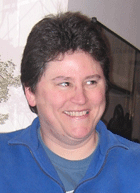 Lori L. Lake, writer, editor, reviews four
books this issue, from YA fiction to a book on writing of interest to
writers:
Lori L. Lake, writer, editor, reviews four
books this issue, from YA fiction to a book on writing of interest to
writers:Erik & Isabelle
Order of the Poison Oak
Rosemary and Juliet
Some Writers Deserve to Starve: 31 Brutal Truths about the Publishing Industry
 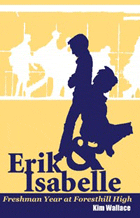 Erik
& Isabelle: Freshman Year at Foresthill High Erik
& Isabelle: Freshman Year at Foresthill HighBy Kim Wallace Foglight Press, www.foglightpress.com, PO Box 22512, Sacramento, CA. 95822 Paper, 235 pgs/$12.95 ISBN: 0975584804 Isabelle and Erik, teenage friends in their first year of high school, are the heroes of this Young Adult novel. Isabelle comes from a family of former hippies who are Peace Corps volunteering, eccentric geniuses. Free spirits and emotionally open, Isabelle’s household is warm and inviting, and they are not concerned that she has professed a liking for girls. Erik’s household and life are very opposite from Isabelle’s. His father and brother are both Marines, and his household runs with military precision, including their meals being called “rations” and their beds made only with hospital corners. “Erik tried to conform by studying his father and brother’s actions and language, but he never seemed to be able to mimic convincingly what came naturally to them. There was a softness in his demeanor that couldn’t be ordered out….The gentleness in his hazel eyes refused to be hardened. His father saw and despised this softness” (p. 9). That “softness” is disguised as much as possible by Erik because he is gay. This book follows the trials and tribulations of these two young people in their first year of high school. The author has planned four books, one for each year of school, to show the ups and down Erik and Isabelle go through. The writing is clear, to the point, and accessible to teens while not being overly simplistic for the adult reader. Kim Wallace has written a realistic and hopeful book that will be enjoyable for anyone, gay or straight. ~Lori L. Lake, reviewer for The Independent Gay Writer and Midwest Book Review Lori L. Lake, author of the "Gun" Series, Different Dress, Ricochet In Time, Stepping Out: Short Stories, and editor of The Milk of Human Kindness: Lesbian Authors Write About Mothers and Daughters http://www.lorillake.com |
 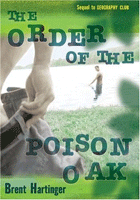 The
Order of the Poison Oak The
Order of the Poison OakBy Brent Hartinger HarperTempest, 1350 Avenue of the Americas, New York, NY. 10019 www.harpertempest.com, Attn: Arija Weddle, Assistant Publicist 2005/$15.99 hardcover/240 pgs/ISBN: 0060567309 Russel Middlebrook, a high school student readers last met in the novel GEOGRAPHY CLUB, is near the end of a very traumatic sophomore year. He was outed in the previous book, and he faced up to the ramifications of that, some of which continue on in the form of low-level verbal abuse from other students. “I’d put up with this kind of crap ever since we’d gone public with our Gay-Straight-Bisexual Alliance, and frankly I was getting pretty tired of it. Yeah, yeah, sticks and stones can break my bones, but words can never hurt me. First of all, anyone who thinks that words can’t hurt you has obviously never taken sophomore P.E. And second, did it ever occur to whoever wrote that stupid adage that hurtful words might be a pretty good indication that sticks and stones are on the way?” (p. 2). From the start, it’s clear that Russel has a good sense of humor and that he is strong enough to weather the ups and downs of his newly admitted gay status. But that doesn’t mean it’s easy, so he is glad that summer arrives, and he is heading off to be a camp counselor with his best friends Min and Gunnar. He figures they’ll goof off, swim, play games with kids, and generally have a great time. No one need ever know he’s gay. What a surprise to find out how wrong he is! For the first two-week camp session, Russel is assigned a cabin of ten-year-old boys, all of whom are burn survivors. They go on the rampage almost immediately. At first Russel is inclined to cut them far too much slack because he pities them, but he quickly loses control. Some of the early laughs in the book come from his internal musings about what brats they all are and how helpless he feels trying to keep them in line. Pity doesn’t help; he has to learn to treat them the same as other kids and hold them to the same standards. Meanwhile, he doesn’t see that much of Min and Gunnar, but he does meet one of the other counselors, Web Bastian, who is a real looker. Unfortunately, Min is also enamored with Web, and Russel’s friendship with Min could be at risk. In fact, his friendship with Gunnar suffers some slings and arrows, too, and Russel is at wit’s end. Only Otto, another counselor who attended the camp when he was younger and is also a burn survivor, is a steadying force for Russel. The story reads very much like a teenager is narrating it. At the same time, Russel has an intuitive side to him that is a delight. His strong heart shines through every chapter of the book as he learns that scars—both internal and external—as well as secrets can bring people together and tear them apart as well. Hartinger shares the weaknesses in his well-written teenage character as well as his strengths. By showing the discrimination toward both gay youth and toward the scarred burn victims, the author makes it clear that any kind of unfairness, any kind of pain is hard on kids, and only by banding together for support can it be transcended. This is a funny, touching novel about the continued growth and self-awareness that one young man attains during what should be ordinary summer camp events, but are really quite extraordinary experiences. Russel is the kind of character you wished you knew in real life, and this is a book that stays with you long after you’ve finished it. With this third novel from Brent Hartinger, I can see that he is an author who is only becoming more accomplished in his writing style, and I look forward to many years of reading his work. This book is highly recommended for all youth, ages 13 to 113. |
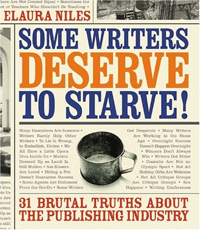 Some
Writers Deserve To Starve: 31 Brutal Truths about the Publishing
Industry Some
Writers Deserve To Starve: 31 Brutal Truths about the Publishing
IndustryBy Elaura Niles elaura@elauraniles.com Writer’s Digest Books, 4700 E. Galbraith Road, Cincinnati, OH 45236, www.fwpublications.com, Attn: Greg Hatfield, Publicity Manager 2005/240 pgs/$14.99/ISBN: 1582973547 From the very first entry, “Some Starving Artists Deserve To Starve,” Elaura Niles gets straight to the point. She tells about when she was first a novice writer and attended a presentation given at the local library by a literary agent named Carolyn Swayze. Niles was certain that if she could “just find a way to talk to Ms. Swayze privately, tell her my story, I was positive she would want to see the book. I was so convinced of this that I brought all 487 single-spaced, red-inked, coffee-stained pages along with me” (p. 16). Instead of a private consult with the agent, by the end of the evening Niles realized “I lost my writing virginity and realized I was a ‘crackpot writer’” (p. 17). As a result of what she learned from the literary agent, Niles researched the ins and outs of the publishing business. She realized that she could share loads of information with writers, and this book came to fruition. In a clear, often cutting and usually humorous manner, Niles explains why so many writers do not get published and what they can do to improve their odds. Most of the reasons writers don’t get their books in print have to do with the major gaffes they commit. So, for instance, Niles tells us “Many Writers Fail Because They Are Trying to Sell in the Wrong Markets,” and she offers an amazingly simple solution: Get out of the house and 1) go to the local bookstore; 2) imagine a book like yours; 3) go find it; 4) look around at what section you are in. Quite simply she says, “That’s your market” (p. 34). Whether providing a list of Pros and Cons about the different types and styles of publishers or describing what makes a good query letter, Niles is delightfully brief and funny, more to the point than most other “How-To” books. She writes about the fact that “Hiring A Pro Doesn’t Guarantee Success” and that “Some Agents are Dishonest from the Get-Go.” She often provides resource information, for instance for organizations such as the Association of Author Representatives and the Writers Guild of America. I found myself laughing out loud at times as I read. It’s an odd shaped little book, about 6-by-6 inches, but the graphics, sidebars, and quotations are great! I particularly enjoyed the first quote, from Frank Lloyd Wright: “I’m all in favor of keeping dangerous weapons out of the hands of fools. Let’s start with typewriters” (p. 15). Having worked slush piles for two publishers, I can attest to the fact that the advice Niles gives is accurate and insightful. This is exactly the type of book that should be read by any new writer or by anybody having trouble getting work accepted. I know that I wasn’t aware of a number of the “brutal truths” early in my career, and any writer will be helped by reading Niles’ no-nonsense advice. “Truth 6: Writers Are Like Popcorn: Publishers Buy Them by the Bucket and Eat Them by the Handful” (p. 41). If you want to avoid being a temporary popcorn snack—or being passed over for some other treat—read this book. |
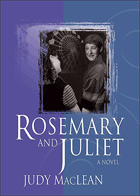 ROSEMARY
AND JULIET ROSEMARY
AND JULIETBy Judy MacLean Alice Street Editions, a div. of Haworth Press, 10 Alice St, Binghamton, NY 13904-1580, www.haworthpress.com 2005/265 pgs/$17.95/ISBN: 1560234830 In the small California community of Divido, high school student Romey Arden is the only out lesbian teenage student. The day she came out—with the support of her ex-hippie, heterosexual, single parent mother—was the day a lot of the kids began shunning her. But not Elliot, the only other gay student. And not Amina, a straight girlfriend who sticks by her through thick and thin. Romey still feels isolated, particularly because there are no other lesbian kids to hang out with. Amina and Elliot are dear to her, but she wonders if she’ll ever meet that special young woman. Julie Wright is unknown to Romey. A gifted singer and student, Julie is home-schooled by her deeply devout Christian parents. When the book opens, Julie’s dad, reverend of the Divido Bible Church, is at the local school board meeting damning homosexual teachers. Meanwhile, his only child is at home lying on her bed letting “moonshine in the window and along her body. She felt that liquid sensation, new to her these past months, blushing over her again. She had a private name for it: Yearning” (p. 23). Nearly age 15, she is “old enough to understand what her dad’s sermons had to say about her own life. To Julie, the sermon said that this new Yearning was her own special blessing, chosen for her by Jesus. Its mystery would be revealed in time, or not. Either way, she would thank Jesus for the inner joy bestowed upon her, welcome Yearning, and protect it” (p. 26). It is inevitable that Julie and Romey should meet, and despite their youth, they both feel the “Yearning.” At first seeing one another requires only a little sneaking around, but soon they are facing major obstacles. It doesn’t take long before Julie’s parents do everything they can to keep the two apart. But the depth of feeling that develops between the two girls can’t be denied. Their actions set off a string of unexpected events that shock everyone in town and cause change and disaster. And with so much against them, can the love of these young women survive? MacLean uses beautiful language and a tight plot that moves along with all due speed toward the startling denouement. The novel’s structure and prose are flawless. One of my favorite scenes contains this description: “Romey ran into the soft night. With every stride, she sensed the moment when both of her feet were off the ground, that moment she was airborne. It was a way to trick relentless old gravity, which, unlike a parent, never lets its attention wander for even half a second, but obsessively keeps you pinned down. Without engine or wings, for moment after moment, perhaps a fifth of every stride, a minute out of every five, twelve whole minute out of every running hour, she was flying. Gliding on air” (p. 64). The novel is packed full of fine writing. It’s by turns serious and also funny in places. With a fine group of secondary characters, this book has it all: compelling plot, unpredictable storyline, and a knockout ending. The mark of a truly fantastic story is that when you finish reading the book, off and on for days you remember the characters and explore alternatives for each person’s future. When you are finished with this expert debut novel, you will find ROSEMARY AND JULIET has left an indelible mark in your memory. Don’t miss this one. |